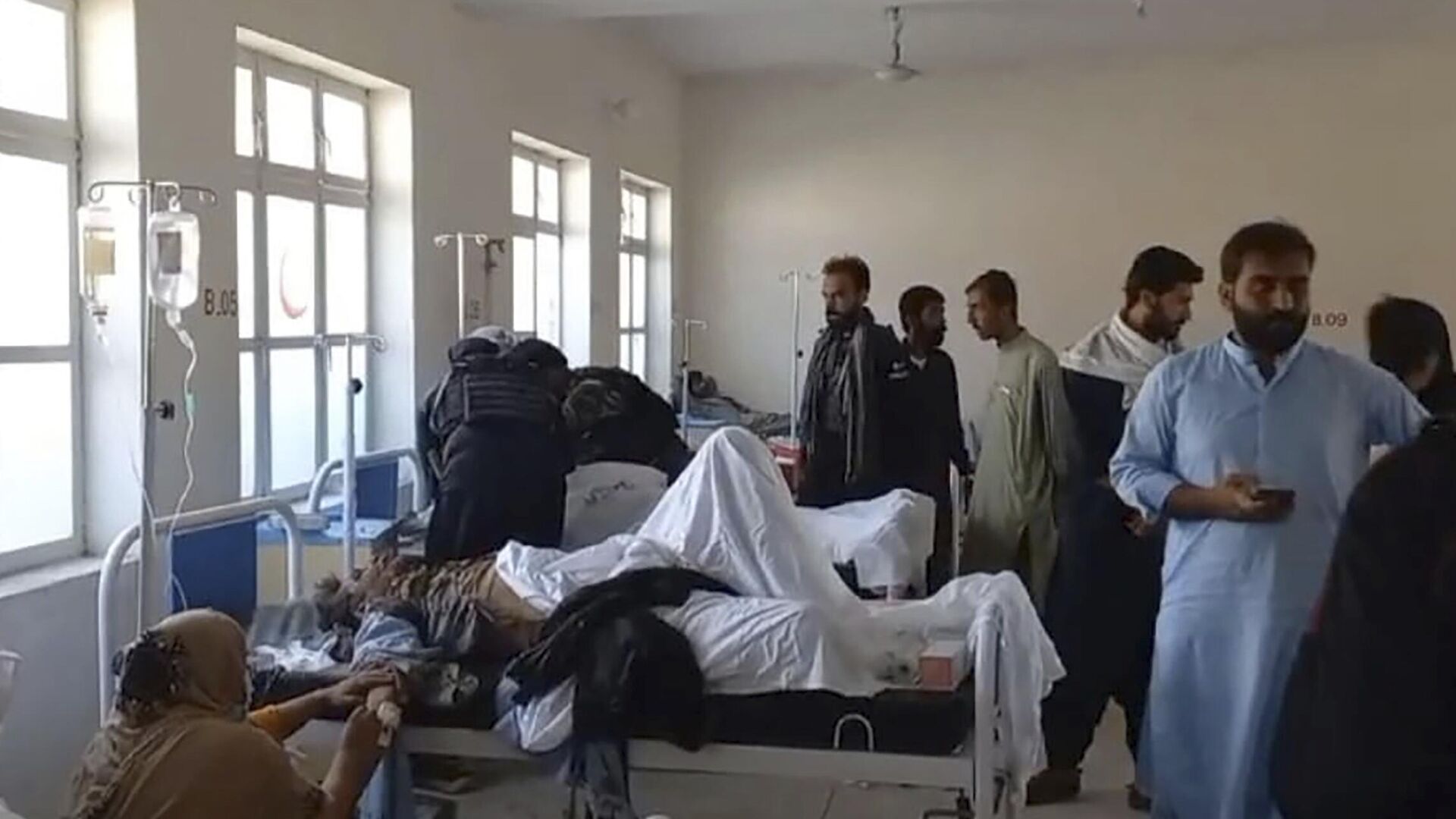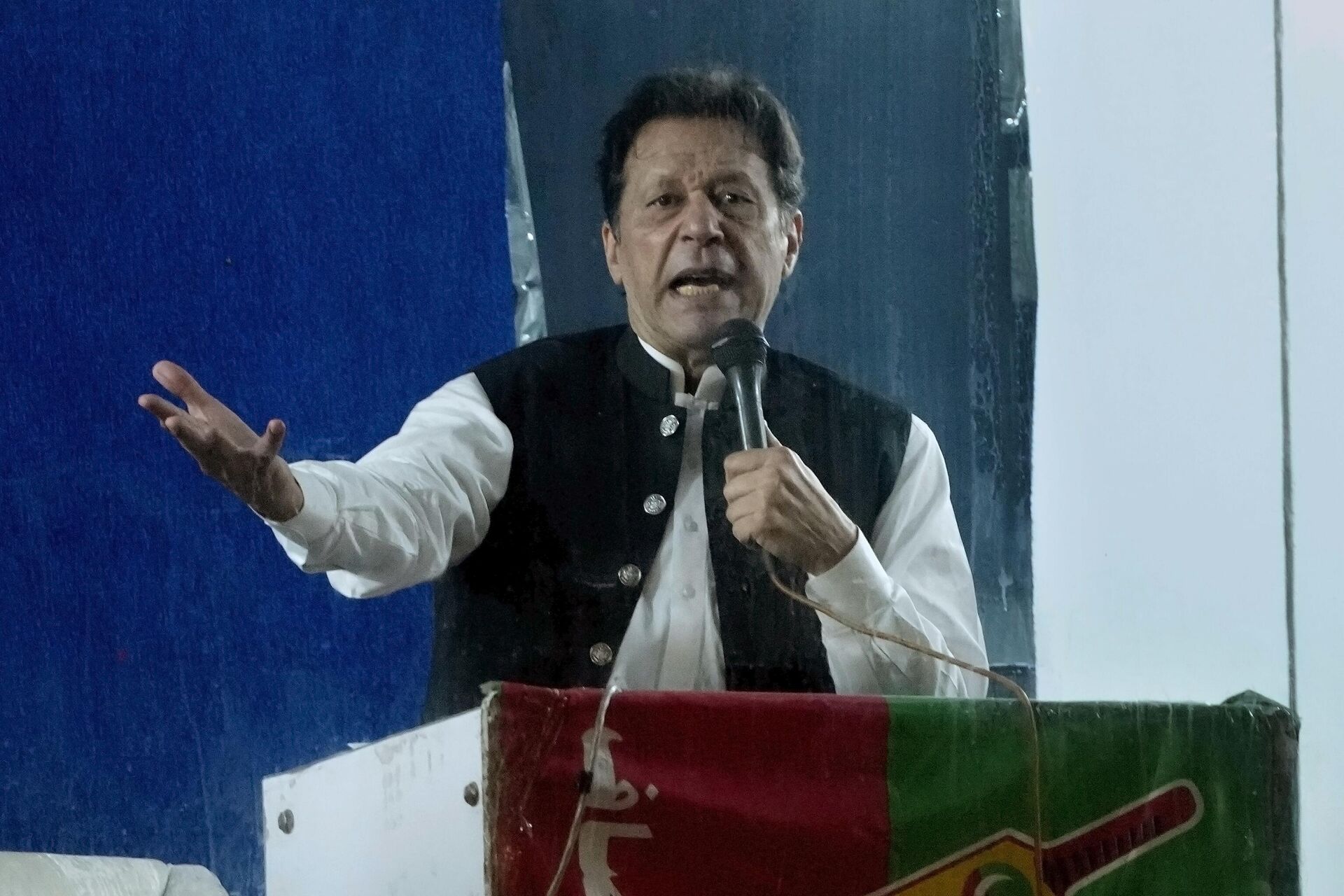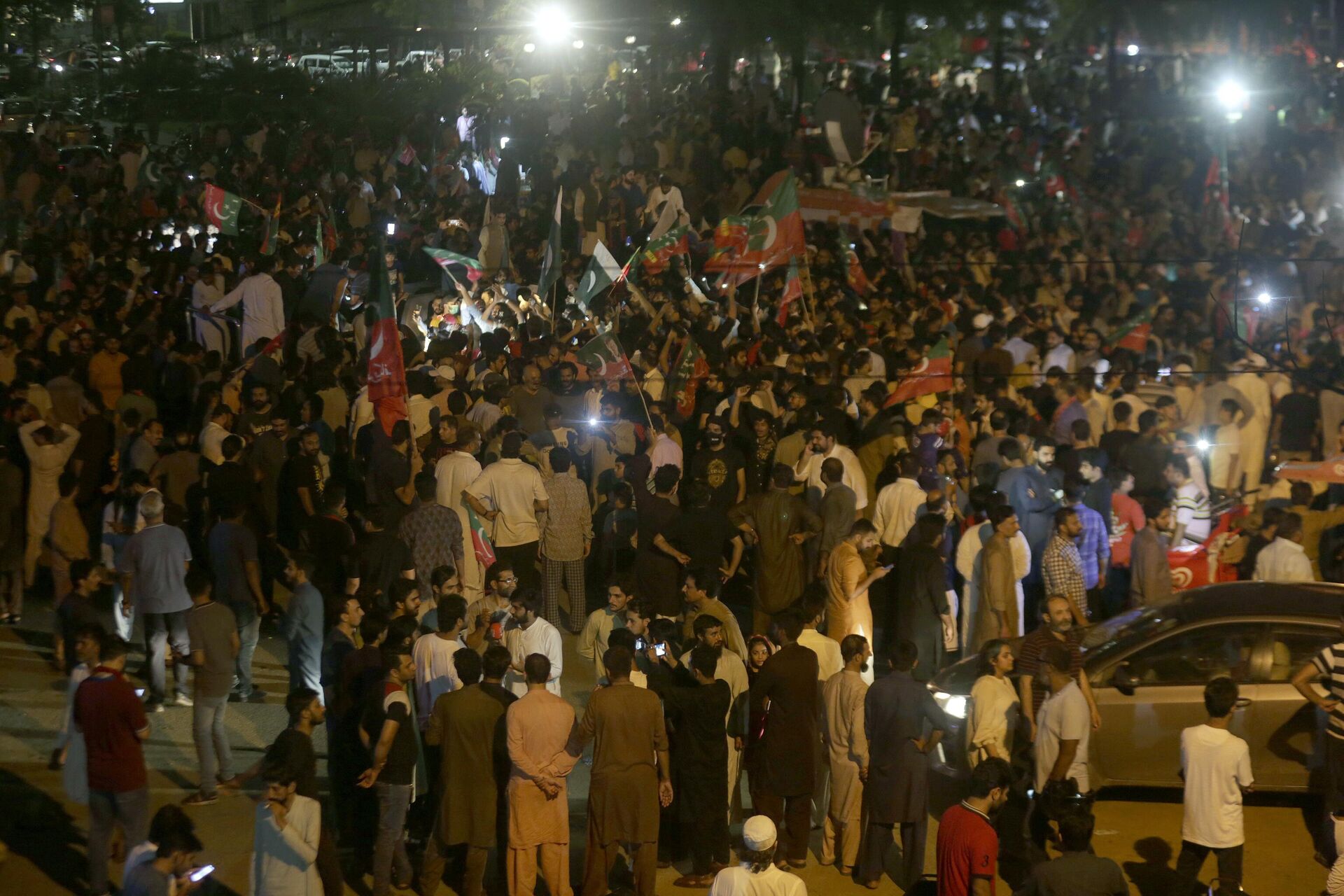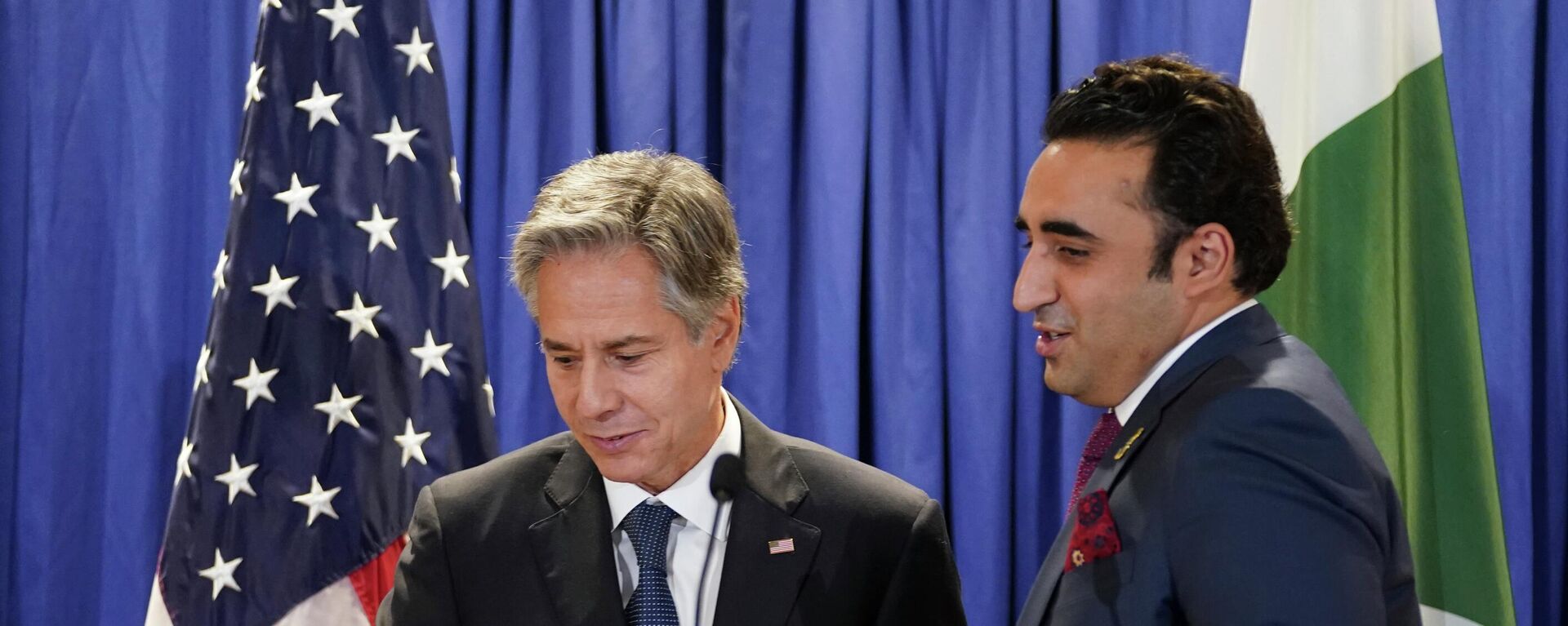https://sputniknews.in/20240202/security-concerns-cast-shadow-over-upcoming-general-elections-in-pakistan-6426118.html
Security Concerns Cast Shadow Over Upcoming General Elections in Pakistan
Security Concerns Cast Shadow Over Upcoming General Elections in Pakistan
Sputnik India
2024 is a historic year for global politics with elections in many countries. Bangladesh recently held elections amid political turmoil, while Pakistan is preparing for major general elections on 8 February.
2024-02-02T20:32+0530
2024-02-02T20:32+0530
2024-02-02T20:41+0530
pakistan
bangladesh
balochistan
tehreek-e-taliban pakistan (ttp)
khyber pakhtunkhwa
political controversy
political crisis
imran khan arrest
imran khan
pakistan tehreek-e-insaf (pti)
https://cdn1.img.sputniknews.in/img/07e7/09/1d/4506189_0:119:2284:1404_1920x0_80_0_0_2c8def0fa2c20b41502e90cd1994bf2c.jpg
Although, the socio-political situation in Pakistan presents distinct challenges compared to Bangladesh, political parties in Pakistan are grappling with security concerns during their campaigning efforts. The situation worsened on Thursday as multiple terrorist attacks and bomb blasts shook various cities in Balochistan and Khyber Pakhtunkhwa (KP), resulting in numerous casualties.The Perpetual Battlegrounds: KP and Balochistan's Ongoing Election ViolenceAccording to media reports, the majority of polling stations in KPK and Balochistan have been designated as highly sensitive due to the significant threat level. This decision comes in the wake of over 40 attacks, resulting in the deaths of 3 political leaders, 14 armed forces personnel, 6 civilians, and 52 injuries within the span of a week.In KPK province, the terrorist organization Islamic State Khorasan Province (ISKP) is carrying out attacks, while in Balochistan province, Baloch Militant Groups are also involved in and behind these assaults. According to media reports, within 24 hours, there were 20 attacks against the Pakistani military in Balochistan.On social media, rumors abound suggesting the possibility of election delays or postponements in certain provinces. In this regard, Sputnik approached, Salman Javed, a senior political analyst.Uncertainty Hovering on ElectionsThe state of Pakistan, today, is grappling with severe security issues in all provinces except Punjab, facing socio-political rifts, numerous attacks, and security challenges.Additionally, she said, "Pakistan's security scenario is a blend of both weak political institutions, and domination of nondemocratic forces in the political process of Pakistan domestically and foreign interference externally. As far as KPK and Baluchistan are concerned, their geographic location make them strategically very important. And we cannot expect that these 2 provinces will not be affected from what is going on in Afghanistan and Iran."On Thursday, the chairperson of Pakistan's election commission convened a meeting to address the issue. Despite rumors circulating on social media about potential election delays in Balochistan and KPK, Caretaker Interior Minister Gohar Ejaz unequivocally stated that the elections would proceed as scheduled on February 8.Unveiling Pakistan's Political Landscape: Foreign Interference vs. Establishment DynamicsHowever, the persistent narrative and question arises as to why these two provinces in Pakistan suffer the most. Is it a failure of internal policies or are foreign powers involved? If foreign interference is at play, why has Pakistan been unable to contain it? Perhaps it is time for Pakistan to reevaluate its security policies.The inquiry into who is behind these challenges is crucial: are foreign entities involved in sabotaging Pakistan's election, or is it a result of internal political dynamics, including the role of the establishment?These pressing questions underscore the need for a comprehensive examination of the factors contributing to the security challenges in these regions."The need for a comprehensive reevaluation of security policies becomes apparent, with a focus on addressing both internal vulnerabilities and external machinations," in concluding remark by S.Javed.
https://sputniknews.in/20240131/us-political-manipulation-challenge-democracy-in-pakistan-amid-election-campaign-6401515.html
pakistan
bangladesh
balochistan
khyber pakhtunkhwa
us
washington d.c.
Sputnik India
feedback.hindi@sputniknews.com
+74956456601
MIA „Rossiya Segodnya“
2024
Muhammad Sharif
https://cdn1.img.sputniknews.in/img/07e7/0b/05/5257054_0:0:443:444_100x100_80_0_0_b8bd2af32be62a6eecdb4a84c7fd978f.jpg
Muhammad Sharif
https://cdn1.img.sputniknews.in/img/07e7/0b/05/5257054_0:0:443:444_100x100_80_0_0_b8bd2af32be62a6eecdb4a84c7fd978f.jpg
News
en_IN
Sputnik India
feedback.hindi@sputniknews.com
+74956456601
MIA „Rossiya Segodnya“
Sputnik India
feedback.hindi@sputniknews.com
+74956456601
MIA „Rossiya Segodnya“
Muhammad Sharif
https://cdn1.img.sputniknews.in/img/07e7/0b/05/5257054_0:0:443:444_100x100_80_0_0_b8bd2af32be62a6eecdb4a84c7fd978f.jpg
pakistan, bangladesh, political parties, security concerns, campaigning, terrorist attacks, bomb blasts, balochistan, khyber pakhtunkhwa (kp), casualties, foreign agencies, hostile forces, electoral process, normalcy, election violence, polling stations, threat level, islamic state khorasan province (iskp), baloch militant groups, military, election manipulation, crisis of legitimacy, election delays, postponements, security challenges, imran khan, rally, lahore, shahbaz sharif, snap elections, socio-political rifts, democratic forces, administrative forces, political crisis, constitutional crisis, security scenario, weak political institutions, nondemocratic forces, foreign interference, geographic location, afghanistan, iran, election commission, gohar ejaz, foreign powers, establishment dynamics, internal policies, security policies, proxies, external actors.
pakistan, bangladesh, political parties, security concerns, campaigning, terrorist attacks, bomb blasts, balochistan, khyber pakhtunkhwa (kp), casualties, foreign agencies, hostile forces, electoral process, normalcy, election violence, polling stations, threat level, islamic state khorasan province (iskp), baloch militant groups, military, election manipulation, crisis of legitimacy, election delays, postponements, security challenges, imran khan, rally, lahore, shahbaz sharif, snap elections, socio-political rifts, democratic forces, administrative forces, political crisis, constitutional crisis, security scenario, weak political institutions, nondemocratic forces, foreign interference, geographic location, afghanistan, iran, election commission, gohar ejaz, foreign powers, establishment dynamics, internal policies, security policies, proxies, external actors.
Security Concerns Cast Shadow Over Upcoming General Elections in Pakistan
20:32 02.02.2024 (Updated: 20:41 02.02.2024) 2024 is a historic year for global politics with elections in many countries. Bangladesh recently held elections amid political turmoil, while Pakistan is preparing for major general elections on 8 February.
Although, the socio-political situation in Pakistan presents distinct challenges compared to Bangladesh, political parties in Pakistan are grappling with security concerns during their campaigning efforts.
The situation worsened on Thursday as
multiple terrorist attacks and bomb blasts shook various cities in
Balochistan and
Khyber Pakhtunkhwa (KP), resulting in numerous casualties.
“Foreign agencies and hostile forces seek to disrupt the electoral process in Pakistan. Nevertheless, the Pakistani establishment remains resolute in its determination to conduct country elections, aiming to send a clear signal that normalcy will be restored in due course," Dr Tughral Yamin, an analyst, a think tanker at Institute of Policy studies Islamabad, & Ex Brigadier of Pakistan’s Army, told Sputnik News.
The Perpetual Battlegrounds: KP and Balochistan's Ongoing Election Violence
According to
media reports, the majority of polling stations in KPK and Balochistan have been designated as highly sensitive due to the significant threat level. This decision comes in the wake of over 40 attacks, resulting in the deaths of 3 political leaders, 14 armed forces personnel, 6 civilians, and 52 injuries within the span of a week.
In KPK province, the terrorist organization Islamic State Khorasan Province (ISKP) is carrying out attacks, while in Balochistan province, Baloch Militant Groups are also involved in and behind these assaults. According to media reports, within 24 hours, there were 20 attacks against the Pakistani military in Balochistan.
"A general discontent over the election manipulation have created a severe crisis of legitimacy for the upcoming government," a political analyst, Professor Dr. Uzma Siraj, told Sputnik.
On social media, rumors abound suggesting the possibility of election delays or postponements in certain provinces. In this regard, Sputnik approached, Salman Javed, a senior political analyst.
"In the run-up to the upcoming general elections in Pakistan, political parties in Khyber Pakhtunkhwa (KP) and Balochistan are confronting formidable security challenges. A stark example is the recent attack in Siddiqabad, Bajaur, which claimed the life of an election candidate affiliated with the PTI and left his guards injured," a Pakistani expert told Sputnik.
Uncertainty Hovering on Elections
The state of Pakistan, today, is grappling with severe security issues in all provinces except
Punjab, facing socio-political rifts, numerous attacks, and security challenges.
"The rift between democratic and administrative forces in the country are leading towards a severe political and constitutional crisis in Pakistan, which presents a bleak security scenario under current circumstances," a political analyst, Professor Dr. Uzma Siraj, told Sputnik.
Additionally, she said, "
Pakistan's security scenario is a blend of both weak political institutions, and domination of nondemocratic forces in the political process of Pakistan domestically and foreign interference externally. As far as KPK and Baluchistan are concerned, their geographic location make them strategically very important. And we cannot expect that these 2 provinces will not be affected from what is going on in Afghanistan and Iran."Some analysts on media have suggested that the lack of security for political campaigns in these provinces may indicate a preplanned attempt to disrupt the elections and create unrest.
On Thursday, the chairperson of Pakistan's
election commission convened a meeting to address the issue. Despite rumors circulating on social media about potential election delays in Balochistan and KPK, Caretaker Interior Minister Gohar Ejaz unequivocally stated that the elections would proceed as scheduled on February 8.
Unveiling Pakistan's Political Landscape: Foreign Interference vs. Establishment Dynamics
However, the persistent narrative and question arises as to why these two provinces in Pakistan suffer the most. Is it a failure of internal policies or are foreign powers involved? If foreign interference is at play, why has Pakistan been unable to contain it? Perhaps it is time for Pakistan to reevaluate its security policies.
The inquiry into who is behind these challenges is crucial: are foreign entities involved in sabotaging Pakistan's election, or is it a result of internal political dynamics, including the role of the establishment?
These pressing questions underscore the need for a comprehensive examination of the factors contributing to the security challenges in these regions.
"The geopolitical importance of the Khyber Pakhtunkhwa (KP) and Balochistan makes them tempting targets, evident in the presence of proxies allegedly funded by external actors," Javed said.
"The need for a comprehensive reevaluation of security policies becomes apparent, with a focus on addressing both internal vulnerabilities and external machinations," in concluding remark by S.Javed.
"Pakistan needs to reevaluate and recalculate its threats scenario and make comprehensive adjustments in its security policy at regional and domestic levels. Keeping a blind eye and propagating a set narrative towards these issues from certain institutions will only fueling the current crisis," Professor Dr. Uzma Siraj expressed.





